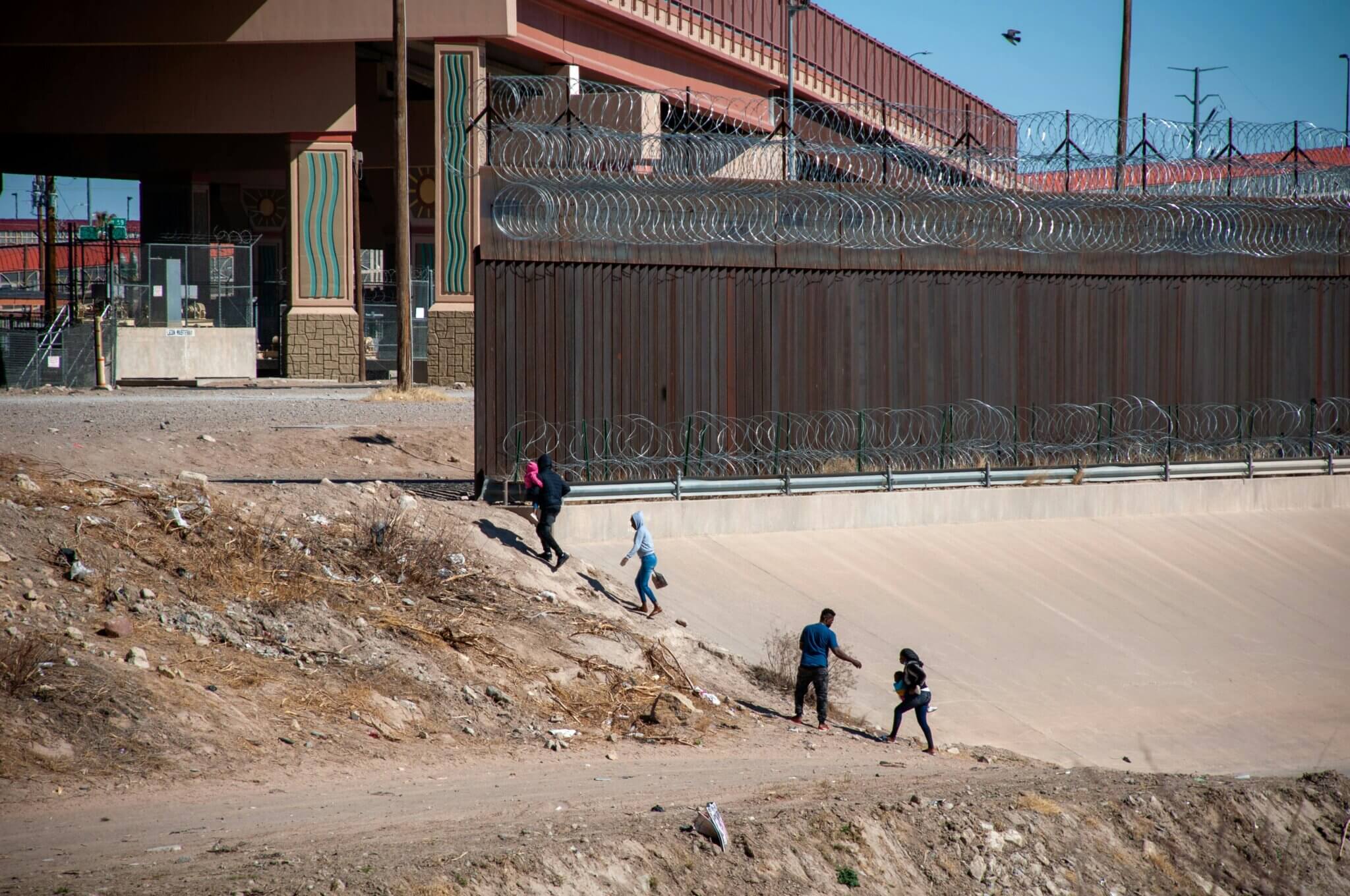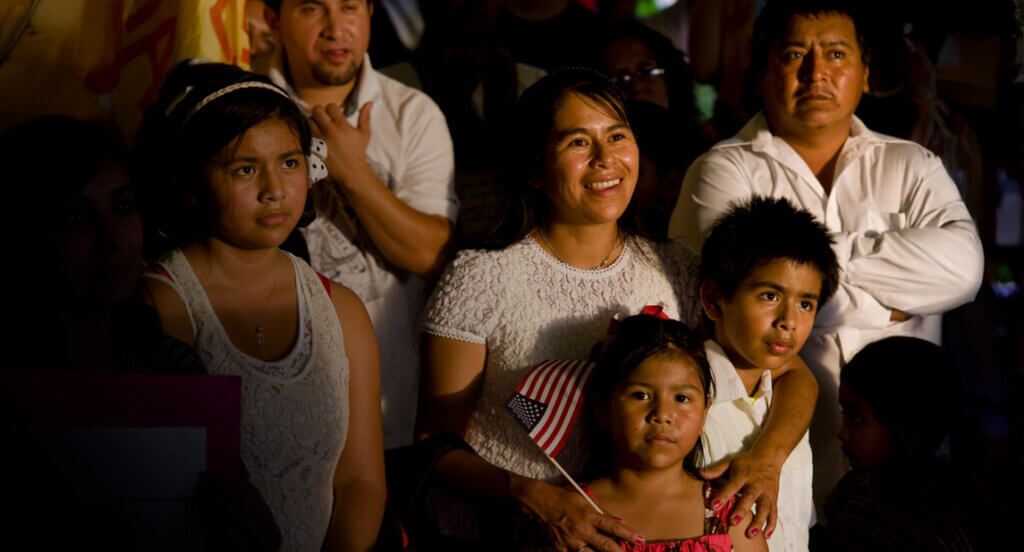Immigration by the Numbers: What Does Recent Polling Show About Latino Views About Migration to the U.S.-Mexico Border and U.S. Border Policy
Immigration by the Numbers is a series of timely, data-driven analyses of key immigration issues facing the Latino community and U.S. policymakers
By Cristobal Ramon and Viktor Olah
Over the last 10 years, migration to the U.S.-Mexico border has dominated the U.S. immigration debate. While concerns about this migration stretch back to the 1980s, the number of border arrivals has concerned the public and lawmakers since 2014 when the current form of border migration – one primarily consisting of families and children seeking asylum – emerged and began entering public polling on this issue.
Polling of Latino voters consistently shows that their top immigration policy priority is legalization for long-residing undocumented immigrants, but their views on border policy are less known. An assessment of 38 polls published between 2013 and 2024[1] shows Latinos are growing increasingly concerned about the increase in border arrivals.
Although the polls use different samples, which prevents direct side-by-side comparisons of their findings, they collectively suggest Latinos want an effective and humane approach to migration to the border, diverging from President Biden’s potential plan to tighten asylum access at the border along with some recent public opinion polling of all Americans.
Methodological Issues with Polling Latinos
Studies of public opinion polling of Latinos highlight two issues that can impact their accuracy. First, they note that some polls may not have statistically representative or robust sample sizes of Latino respondents. This limitation can contribute to margin of error issues that undermine the poll’s overall accuracy where Latinos are concerned. Second, some polls may not be using culturally competent methods most effective in surveying this population, including language usage/terms reflected in the questionnaire and bilingual interviewees who can engage the respondent in their preferred language.
Latino Views on Migration to the U.S.-Mexico Border and Border Policies
Several recent polls provide some insight into Latino views about migration to the U.S.-Mexico border. As Figure 1 shows, a January 2024 CBS News poll that surveyed U.S. adults’ level of concern about border arrivals and their impact on the United States showed both Latinos and the larger respondent group viewed this form of migration as a “Crisis” or “Very Serious Problem.”
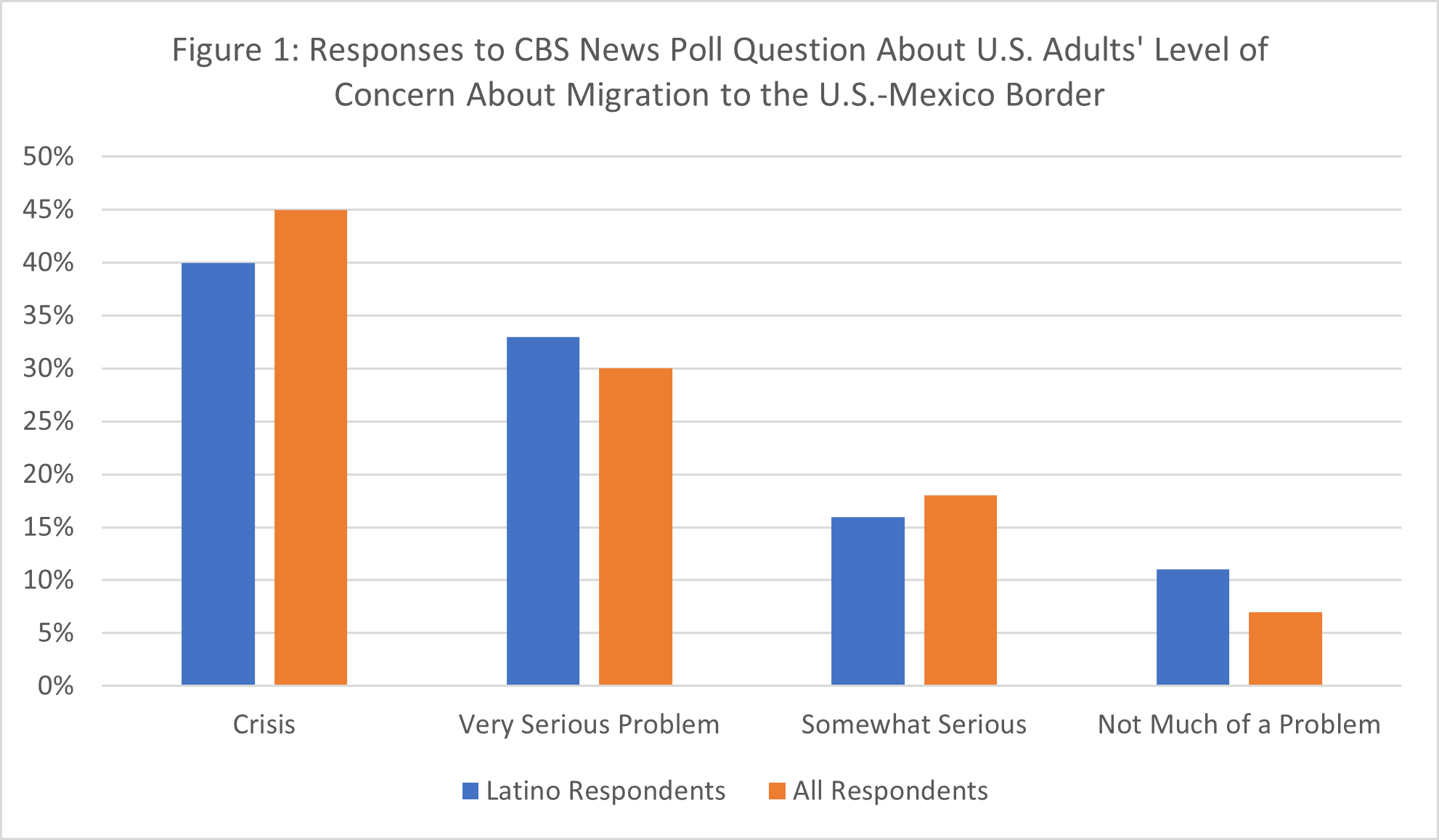
Respondents who described the level of concern as a crisis or very serious problem could also select their primary concern from five options. As Figure 2 shows, Latinos had equal concerns about national security and the United States’ ability to receive these individuals, mirroring the response rate from all participants.
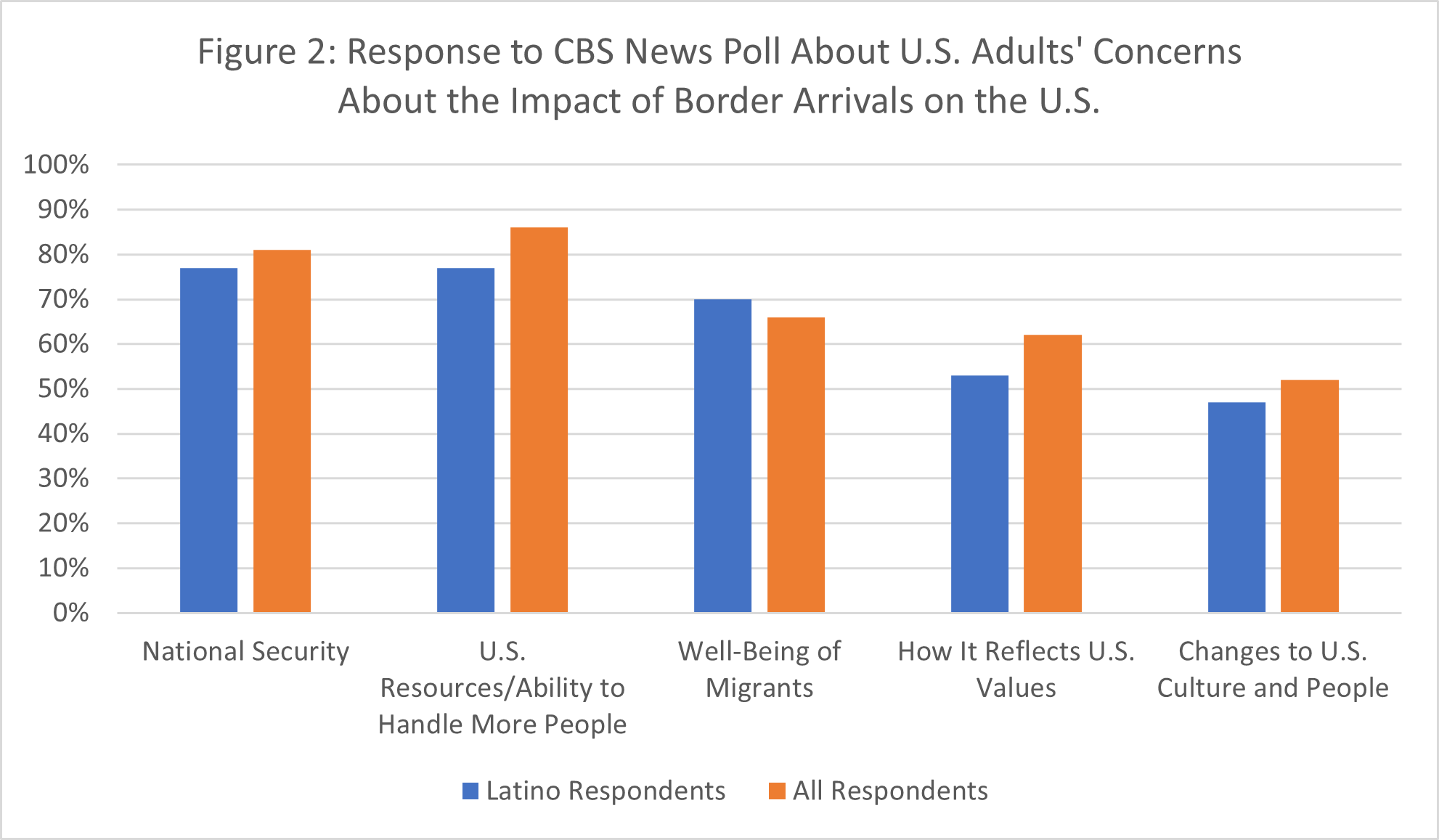
UnidosUS’s November 2023 survey of Latino voters asked respondents to identify their preferences among a list of border security policies. As Figure 3 shows, respondents chose providing asylum to individuals fleeing violence or war and increasing border security as their main immigration policy priority among the four options related to migration to the U.S.-Mexico border.
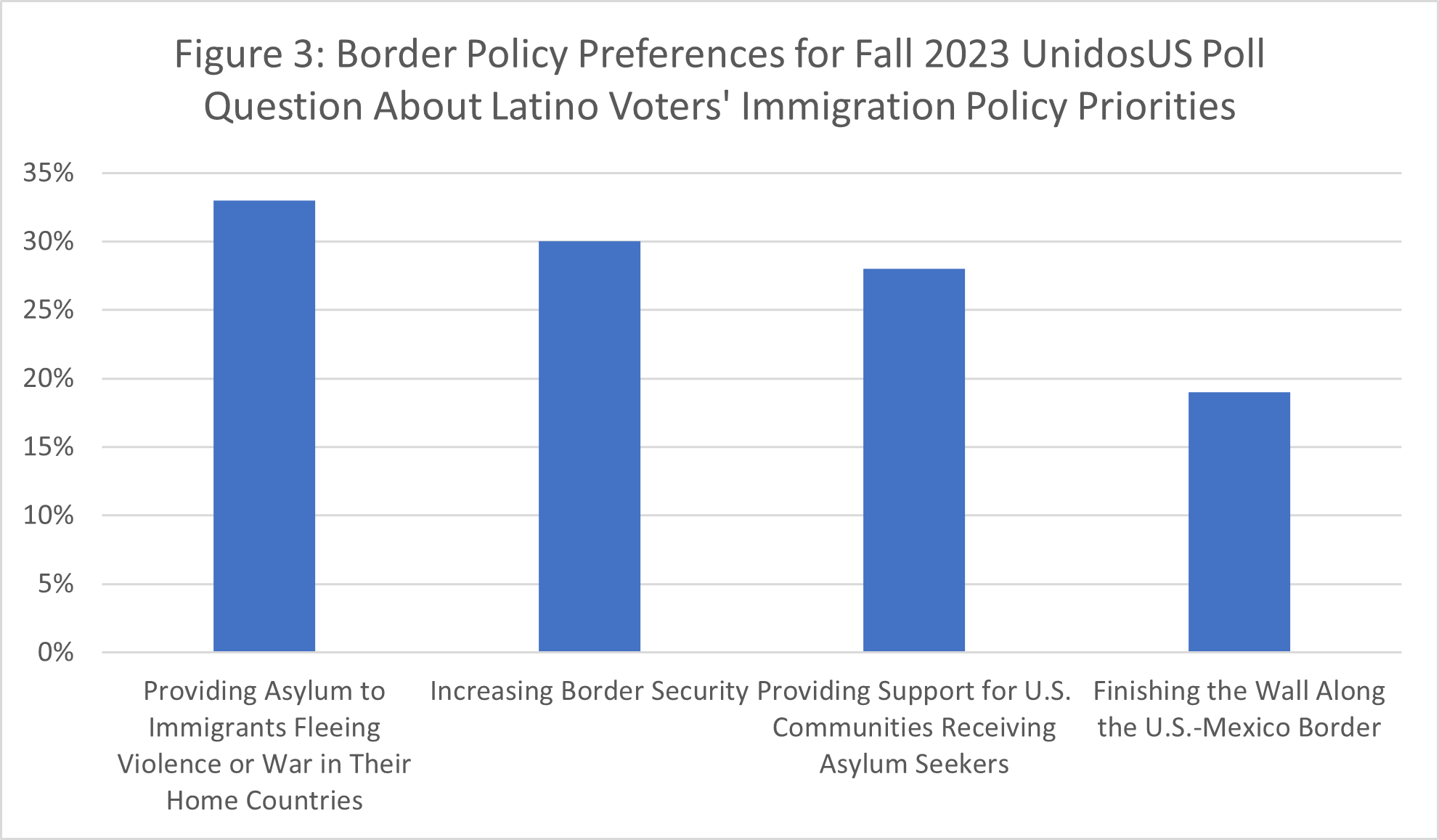
Other polling provides additional evidence for these potential inferences about Latino border policy preferences. For example, a January 2024 Quinnipiac poll of U.S. adults showed approved of the Biden administration’s parole program that allows Cubans, Haitians, Nicaraguans, and Venezuelans to come to the United States if they secure a sponsor; overall, 60 percent of respondents supported this program.
The polls suggest Latino respondents may be wary of hardline border policies compared to other groups. A 2023 New York Times poll of registered voters in battleground states[2] and a 2023 Quinnipiac national poll of registered voters showed slight majorities of voters support building a border wall. In contrast, 63 percent of Latino voters opposed the wall in the New York Times poll, while 53 percent of Latinos said the same in the Quinnipiac poll. A March 2023 Quinnipiac national poll of U.S. adults also noted that 53 percent of Hispanic participants opposed detaining immigrant families who crossed the border compared to 46 percent of all respondents.
The Political Implications of These Polls
These findings have implications for negotiators working to build support for border security policies and political leaders who expect to engage the Latino community about border security measures.
First, the polling suggests that the Latino community – like other groups in the country – wants an orderly and secure form of migration to the U.S.-Mexico border, a point that reporting on this community regularly misses when discussing their immigration policy preferences.
There is also sufficient evidence that Latinos may be wary of border policies that target vulnerable populations, however. The existing polling also suggests a preference for balancing border security with smart, humanitarian measures like expanded pathways for creating alternatives to migrating to the U.S.-Mexico border.
While the current slate of polling provides an initial sketch of the types of policies Latinos want from their lawmakers, border policy now encapsulates border, hemispheric, and municipal measures. Latino voters, like all Americans, have the right to shape how individuals enter the country and under which conditions. However, political leaders developing border policies have yet to engage them deeply, and that must change.
Better polling can help with this task. As noted earlier, polling of Latinos on border policies to date has had serious limitations. Additional work is needed to dig into Latinos’ preferences to better inform policymakers and ensure they have a seat at the table. These polls can also improve by using culturally competent methodologies to gather information from representative samples of Latinos at the state and national levels.
[1] The authors reviewed eighty-two polls from non-partisan sources such as Gallup, Pew Research Center, and Quinnipiac University as well as organizations that represent Latinos such as the Libre Initiative and UnidosUS. Their analyses narrowed this group to thirty-eight polls that 1) focused on Latinos or had breakdown of the responses from Latino participants and 2) asked questions about their views about migration to the U.S.-Mexico border, its impact on the U.S., and/or their policy preferences for addressing this issue.
[2] These states are Arizona, Georgia, Michigan, Nevada, Pennsylvania, and Wisconsin.
